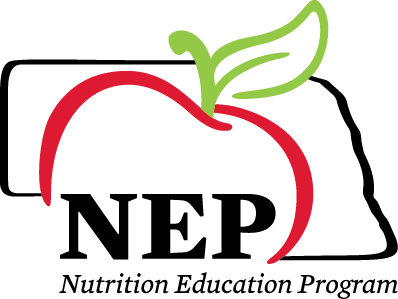The Nutrition Education Program (NEP) in Nebraska helps families on a limited budget make healthier food choices and choose physically active lifestyles by acquiring the knowledge, skills, attitudes, and behavior changes necessary to improve their health. NEP is free to all participants who meet income guidelines. NEP is funded through Supplemental Nutrition Assistance Program – Education Division (SNAP-Ed) and Expanded Food and Nutrition Education Program (EFNEP). Together with community partnerships, NEP strives to improve the health of Nebraskans.
What is SNAP-Ed?
Supplemental Nutrition Assistance Program Education (SNAP-Ed) is an evidence-based program that helps people lead healthy, active lives. SNAP-Ed teaches people how to make their SNAP dollars stretch, how to shop for and cook healthy meals, and how to stay physically active. SNAP-Ed partners with state and local organizations to meet people where they are. SNAP-Ed initiatives include nutrition education classes and efforts to improve policies, systems, and the environment (PSE) of communities. Our PSE strategies include school wellness, community and school gardens, healthy food pantries, and child care center wellness.
What is EFNEP?
The Expanded Food and Nutrition Education Program (EFNEP) uses education to support participants' efforts toward self-sufficiency, nutritional health, and well-being. EFNEP combines hands-on learning, applied science, and program data to ensure program effectiveness, efficiency, and accountability.
Impact
Additional Food Assistance Programs and Information
Families who are participating in NEP may also want to explore these resources.
- Supplemental Nutrition Assistance Program (SNAP)
- Nebraska SNAP online application or Phone: (800) 383-4278
- Double Up Food Bucks
- Nebraska Commodity Supplemental Food Program (CSFP)
- Nebraska Supplemental Nutrition Program for Women, Infants and Children (WIC)
- Summer Food Service Program
- National School Lunch Program (NSLP)
- Food Bank for the Heartland
- Food Bank of Lincoln
- Temporary Assistance for Needy Families (TANF)
This material was funded by USDA’s Supplemental Nutrition Assistance Program – SNAP and Expanded Food & Nutrition Education Program (EFNEP). In accordance with Federal civil rights law and U.S. Department of Agriculture (USDA) civil rights regulations and policies, the USDA, its Agencies, offices, and employees, and institutions participating in or administering USDA programs are prohibited from discriminating based on race, color, national origin, sex, religious creed, disability, age, political beliefs, or reprisal or retaliation for prior civil rights activity in any program or activity conducted or funded by USDA.
Persons with disabilities who require alternative means of communication for program information (e.g. Braille, large print, audiotape, American Sign Language, etc.), should contact the Agency (State or local) where they applied for benefits. Individuals who are deaf, hard of hearing or have speech disabilities may contact USDA through the Federal Relay Service at (800) 877-8339. Additionally, program information may be made available in languages other than English.
To file a program complaint of discrimination, complete the USDA Program Discrimination Complaint Form, (AD-3027) found online at: http://www.ascr.usda.gov/complaint_filing_cust.html, and at any USDA office, or write a letter addressed to USDA and provide in the letter all of the information requested in the form. To request a copy of the complaint form, call (866) 632-9992. Submit your completed form or letter to USDA by: (1) mail: U.S. Department of Agriculture Office of the Assistant Secretary for Civil Rights 1400 Independence Avenue, SW Washington, D.C. 20250-9410; (2) fax: (202) 690-7442; or (3) email: program.intake@usda.gov. This institution is an equal opportunity provider.
The Nutrition Education Program (NEP) delivers evidence-based nutrition education and obesity prevention interventions through a combination of education strategies coupled with multi-level community changes that occur within the environment to promote healthy eating and active lifestyles.
This material was funded by USDA's Supplemental Nutrition Assistance Program – SNAP and Expanded Food & Nutrition Education Program (EFNEP).
